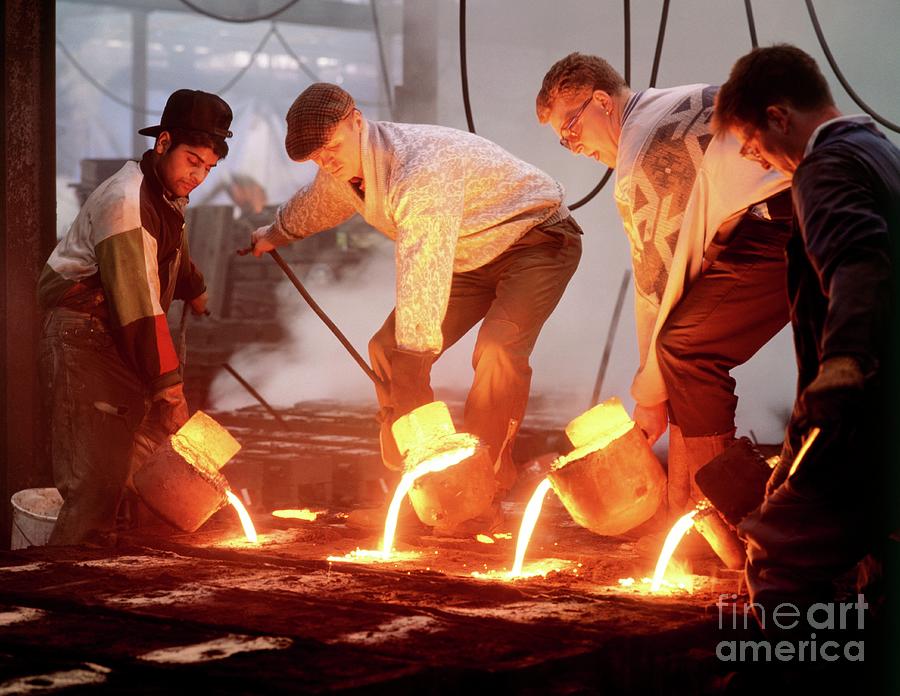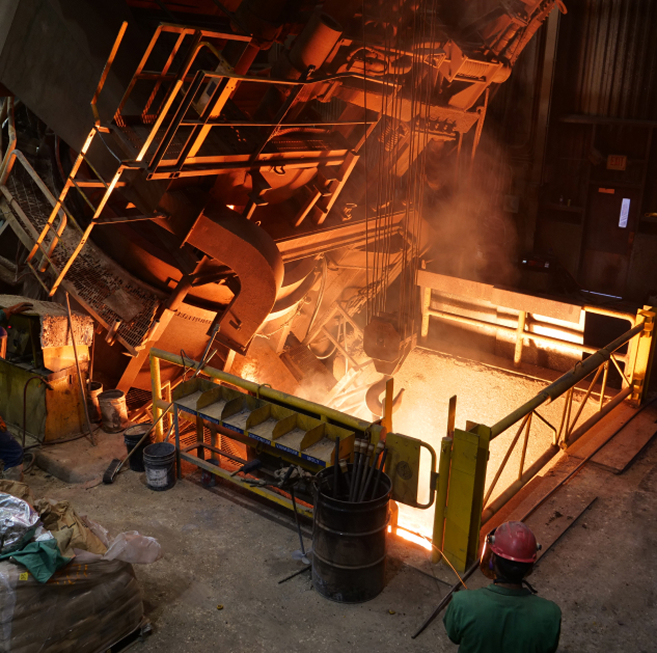How a Metal Foundry Adds To Sustainable Metal Production Practices
Metal foundries play a necessary function in promoting sustainability within the metal production market. By integrating recycled products, they reduce reliance on virgin sources and decrease environmental effects. Energy-efficient melting processes additionally reduce power intake and exhausts. However, the trip towards sustainable techniques entails more than just recycling and energy monitoring. It encompasses a broader commitment to ethical sourcing and ingenious technologies. The ramifications of these practices are significant and warrant closer assessment.
The Duty of Recycling in Metal Foundries
While metal manufacturing has actually traditionally depended on virgin products, the raising focus on sustainability has actually caused a considerable change in practices, specifically in metal foundries. Recycling has actually emerged as a necessary element of this improvement, allowing foundries to repurpose scrap metal and decrease reliance on extracted resources. By incorporating recycled products into their procedures, foundries not just lower ecological impact but also reduced production expenses.
The use of recycled metals, such as steel, light weight aluminum, and copper, minimizes power usage and decreases greenhouse gas discharges linked with typical mining and refining approaches. Foundries can accomplish high-grade outcomes by using advanced sorting and processing innovations to assure the purity of recycled materials. This focus on reusing fosters a circular economic climate, where waste is lessened, and resources are used efficiently. Consequently, metal foundries play a crucial function in advertising lasting practices within the metal production market.
Energy-Efficient Melting Methods
Energy-efficient melting techniques are crucial for enhancing sustainability in metal manufacturing. These methods significantly minimize power consumption throughout the melting procedure, which is one of one of the most energy-intensive phases in metal manufacturing. Technologies such as induction melting, resistance home heating, and microwave melting offer improved effectiveness contrasted to conventional approaches. Induction melting, for instance, uses magnetic fields to produce warmth straight within the metal, lessening power loss and giving accurate temperature level control.
In addition, carrying out warm recuperation systems can further enhance efficiency by catching and reusing waste warm produced throughout melting. Utilizing sophisticated insulation products and maximizing heater layouts also add to energy savings. By adopting these cutting-edge melting techniques, metal foundries can lower their carbon impact, reduce functional prices, and add to an extra sustainable production landscape. The integration of energy-efficient methods not just straightens with ecological objectives however likewise fulfills the expanding need for responsible production methods in the metal market.
Lasting Sourcing of Raw Products
Lasting sourcing of resources is necessary for decreasing the ecological influence of metal manufacturing. This entails the raised usage of recycled metals, the fostering of ethical mining techniques, and efforts focused on local sourcing. By prioritizing these strategies, the sector can advertise accountable resource monitoring and support local economic climates.

Recycled Metal Usage
Just how can industries properly decrease their ecological impact while fulfilling the growing demand for metal? One substantial approach is the use of recycled metal. By incorporating scrap metal into their production processes, foundries can decrease the removal of virgin materials, thereby decreasing and preserving natural resources power usage. Recycled steels call for less energy to process contrasted to their raw equivalents, causing reduced greenhouse gas discharges. In addition, using recycled metal assists draw away waste from land fills, promoting a circular economic climate. Industries that focus on recycled metal not just add to sustainability but additionally take advantage of expense financial savings connected with reduced material purchase. Consequently, recycled metal usage stands as a necessary approach for ecologically accountable metal manufacturing.
Moral Mining Practices
While the demand for metals proceeds to rise, sectors are increasingly recognizing the value of honest mining techniques in making sure responsible sourcing of raw products. Ethical mining incorporates a commitment to environmental stewardship, social obligation, and adherence to fair labor practices. Companies are currently focusing on partnerships with mines that show transparency in their operations, decreasing eco-friendly effect and valuing local neighborhoods. This approach not only cultivates a sustainable supply chain yet additionally enhances the credibility of services involved. By implementing strenuous requirements and accreditations, markets can deal with unlawful mining activities and advertise the welfare of employees. Eventually, ethical mining practices add substantially to a much more sustainable metal manufacturing ecological community, lining up economic development with social and ecological honesty.
Local Sourcing Campaigns

Innovations in Metal Casting Processes
Technologies in metal casting procedures are changing the sector by integrating sophisticated recycling methods that minimize waste. Energy-efficient melting approaches are additionally being developed to reduce power intake throughout production. Furthermore, the use of ingenious mold and mildew materials contributes to boosted performance and sustainability in casting procedures.
Advanced Recycling Techniques
Advanced recycling strategies are changing metal casting processes, significantly improving sustainability in the sector. These developments concentrate on reprocessing and reclaiming scrap metal, substantially minimizing waste and the requirement for virgin products. Techniques such as hydrometallurgy and pyrometallurgy make it possible for foundries to draw out valuable steels from utilized components, making certain effective resource use. Furthermore, progressed sorting and filtration innovations improve the high quality of recycled metals, making them appropriate for high-performance applications. This not only lessens the environmental impact of metal production however also promotes a round economic situation by promoting the reuse of products. As these reusing techniques remain to progress, they assure to even more simplify operations within foundries and add to an extra sustainable metal manufacturing landscape.
Energy-Efficient Melting Methods
While standard melting approaches have long been the backbone of metal casting, recent developments have actually introduced energy-efficient read this post here methods that significantly lower energy usage and exhausts. Technologies such as induction melting and electric arc heating systems have gained prestige, enabling exact control over temperature level and reducing the requirement for fossil gas. These approaches not just enhance energy effectiveness yet additionally promote faster melting times, which equates to reduce functional costs. Additionally, advancements in warmth recuperation systems enable foundries to capture and recycle excess warmth produced during the melting process. This all natural strategy to power monitoring not just sustains lasting techniques yet additionally placements metal foundries as leaders in the shift towards greener production procedures, better straightening with worldwide sustainability objectives.
Ingenious Mold Materials
As the demand for even more lasting and efficient metal casting processes grows, the exploration of innovative mold and mildew products has actually come to be a centerpiece in the industry. Traditional mold materials frequently add to ecological difficulties, prompting the search for alternatives that minimize waste and energy intake. Recent innovations consist of the advancement of recyclable compounds and naturally degradable binders, which not just boost mold and mildew performance but additionally minimize eco-friendly impact. Additionally, making use of 3D printing technology in mold development enables detailed designs that minimize material usage and enable rapid prototyping. These ingenious materials not only boost casting accuracy however likewise align with sustainability goals, showcasing the industry's dedication to lowering its carbon impact while maintaining top notch production criteria.
Decreasing Waste Via Advanced Technology
Innovative innovations are transforming the metal manufacturing market by considerably minimizing waste and improving performance. Advanced information analytics and artificial intelligence algorithms make it possible for foundries to optimize production processes, reducing and identifying inadequacies scrap product. Smart sensing units monitor equipment performance in real-time, allowing for predictive maintenance that reduces downtime and waste generation. Additionally, additive manufacturing methods, such as 3D printing, permit the creation of complex parts with very little material usage, markedly decreasing waste compared to typical methods.
Closed-loop systems are coming to be a lot more common, wherein scrap metal and results are reused back into the production cycle, ensuring that products are utilized to their greatest possibility. This assimilation of innovation not only advertises source preservation yet likewise enhances the general sustainability of metal production techniques. By embracing these advancements, foundries can add to an extra lasting future while maintaining competition out there
The Impact of Foundries on Carbon Impact Reduction
Foundries play an essential function in decreasing the carbon footprint of the metal manufacturing market by implementing various lasting methods. By making use of energy-efficient innovations, such as electrical arc heating systems, these centers considerably reduced greenhouse gas emissions contrasted to typical techniques. In addition, foundries progressively take on renewable resource resources, which also reduces their reliance on nonrenewable fuel sources.
Reusing scrap metal is one more critical method that foundries utilize, preserving resources and minimizing the demand for virgin materials. This not just minimizes waste however additionally reduces the energy-intensive extraction processes connected with mining. Additionally, the fostering of closed-loop water systems assists to lessen water usage and decrease wastewater discharge, adding to an extra lasting procedure.
Through these campaigns, foundries demonstrate their commitment to environmental stewardship, leading to a marked reduction in the general carbon impact of the metal manufacturing market. Their recurring initiatives are crucial in the change towards a more sustainable commercial landscape.
Frequently Asked Concerns
What Kinds of Metals Are Many Frequently Recycled in Foundries?
Light weight aluminum, steel, brass, and copper are among one of the most typically recycled metals in foundries. These metals are favored due to their high recycling prices, economic value, and prevalent schedule, adding greatly to industrial sustainability initiatives.
Just How Do Foundries Make Sure the Top Quality of Recycled Products?
Foundries establish the quality of recycled products via extensive screening, sorting, and purification processes. They implement innovative modern technologies to assess make-up and eliminate pollutants, guaranteeing that the recycled steels fulfill sector requirements for performance and you could try here safety.
What Qualifications Exist for Lasting Foundry Practices?
Different certifications exist for lasting foundry methods, including ISO 14001 for environmental management, ISO 50001 for energy management, and LEED qualification for sustainable structure methods (Aluminum Casting). These accreditations aid ensure adherence to environmental and sustainability requirements in operations
Just How Do Foundries Gauge Their Carbon Impact Decrease?
Foundries gauge carbon impact reduction with devices like lifecycle analyses, energy audits, and emissions tracking systems. They contrast baseline discharges to existing outputs, reviewing improvements in power efficiency, material use, and renewable energy fostering over time.
What Are the Economic Advantages of Lasting Metal Production?
Lasting metal production provides financial advantages such as reduced operational expenses, raised efficiency, improved market competition, and potential government rewards. In addition, it cultivates development and draws in eco aware consumers, ultimately driving long-lasting earnings for organizations.
Metal foundries play a vital function in advertising sustainability within the metal manufacturing sector. While metal manufacturing has actually traditionally relied click now on virgin materials, the enhancing emphasis on sustainability has led to a considerable change in techniques, specifically in metal foundries. By incorporating scrap metal into their production processes, foundries can reduce the extraction of virgin products, therefore lowering and preserving all-natural resources energy consumption. Foundries play an essential role in reducing the carbon impact of the metal manufacturing market by carrying out different sustainable practices. Recycling scrap metal is one more vital technique that foundries use, saving sources and decreasing the demand for virgin products.